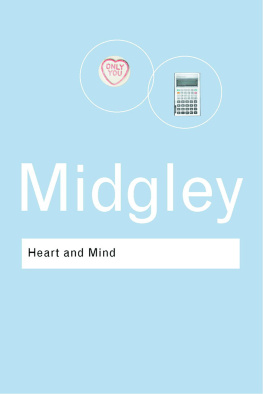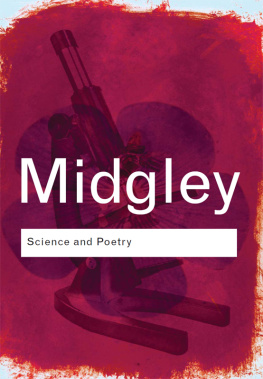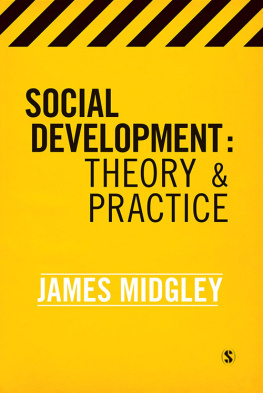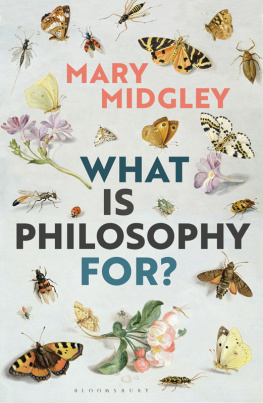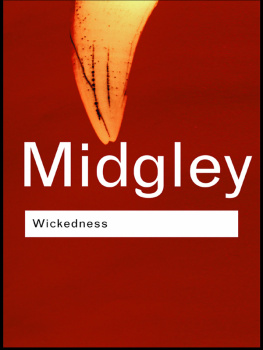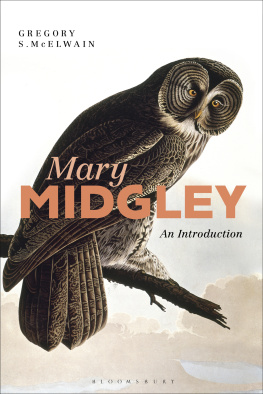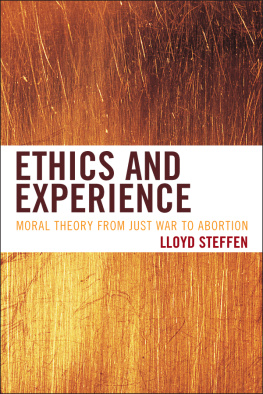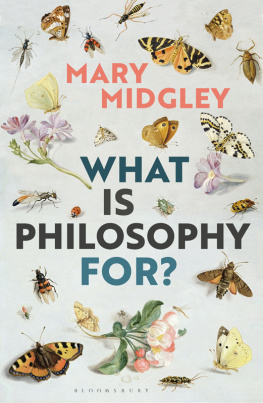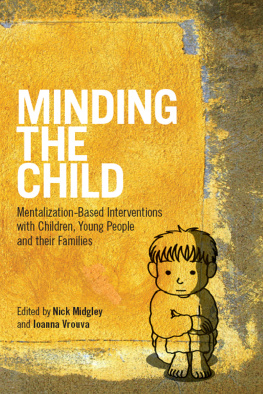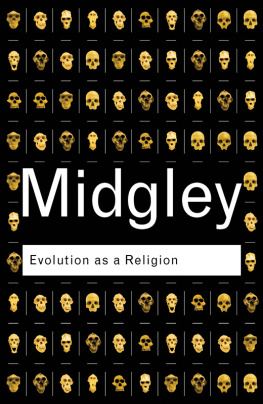Midgley - Heart and mind: the varieties of moral experience
Here you can read online Midgley - Heart and mind: the varieties of moral experience full text of the book (entire story) in english for free. Download pdf and epub, get meaning, cover and reviews about this ebook. year: 2016, publisher: Taylor and Francis;Routledge, genre: Religion. Description of the work, (preface) as well as reviews are available. Best literature library LitArk.com created for fans of good reading and offers a wide selection of genres:
Romance novel
Science fiction
Adventure
Detective
Science
History
Home and family
Prose
Art
Politics
Computer
Non-fiction
Religion
Business
Children
Humor
Choose a favorite category and find really read worthwhile books. Enjoy immersion in the world of imagination, feel the emotions of the characters or learn something new for yourself, make an fascinating discovery.
Heart and mind: the varieties of moral experience: summary, description and annotation
We offer to read an annotation, description, summary or preface (depends on what the author of the book "Heart and mind: the varieties of moral experience" wrote himself). If you haven't found the necessary information about the book — write in the comments, we will try to find it.
Heart and mind: the varieties of moral experience — read online for free the complete book (whole text) full work
Below is the text of the book, divided by pages. System saving the place of the last page read, allows you to conveniently read the book "Heart and mind: the varieties of moral experience" online for free, without having to search again every time where you left off. Put a bookmark, and you can go to the page where you finished reading at any time.
Font size:
Interval:
Bookmark:

Heart and Mind
This is not the usual introduction to moral philosophy, but an invitation to think about the issues. Mary Midgley clearly belongs among those who believe that there are facts, facts of human nature, which have to be the starting-point for any adequate account of human morality. It deserves to be read and remembered well beyond the narrow ranks of the professional philosophers.
The Times Literary Supplement
a genuine contribution to the problems of moral philosophy. These essays emphasize the essential unity of human beings, and make a plea for an interdisciplinary approach to the study of moral philosophy and moral psychology. It is a welcome antidote to the abstract and general ideas (not to mention the pseudo-technicalities) which bedevil much modern moral philosophy.
British Book News
Mary
Midgley
Heart and Mind
The varieties of moral experience
Revised edition with a new introduction by
the author

First published in United Kingdom 1981
by Harvester Press
Published 1983 by Methuen
First published in Routledge Classics 2003
by Routledge
11 New Fetter Lane, London EC4P 4EE
Routledge is an imprint of the Taylor & Francis Group
1981, 2003 Mary Midgley
Introduction to the Routledge Classics edition 2003 Mary Midgley
Typeset in Joanna by RefineCatch Limited, Bungay, Suffolk
Printed and bound in Great Britain by
TJ International Limited, Padstow, Cornwall
All rights reserved. No part of this book may be reprinted,
or reproduced or utilized in any form or by any electronic,
mechanical, or other means, now known or hereafter
invented, including photocopying and recording, or in
any information storage or retrieval system, without
permission in writing from the publishers.
British Library Cataloguing in Publication Data
A catalogue record for this book is available from the British Library
ISBN 0415304490 (pbk)
For all my students and colleagues
who have taught me so much,
but particularly for Carmen
who first told me about the tsuji-giri.
CONTENTS
INTRODUCTION TO THE ROUTLEDGE
CLASSICS EDITION
I have always been partial to this little book because it deals so directly with the theme which has remained central to my psychological thinkingnamely, the unity of human life and the need to treat it as a whole.
I do not think that the need to shout about that unity has gone away in the twenty years since the book came out. To the contrary, as academic specialization deepens and new quarrels constantly break out between rival specialities, this need for a unifying perspective is surely still increasing. But of course the surrounding intellectual scene has changed. I will try to consider briefly here how its changes affect the message of the book.
As far as professional moral Philosophy is concerned, the change is quite marked. We have now (thank goodness) moved out of an era in which English-speaking moral philosophers were supposed to spend their whole time in establishing one of several simple formal views about the meaning of moral judgements. In crude terms, this involved deciding whether someone who said that something was good was
1) perceiving an inexplicable truth about it (Intuitionism)
2) expressing an emotional preference for it (Emotivism), or
3) recommending that it should be brought about (Prescriptivism).
Those were the only views that were supposed to be considered. And, though they were not supposed to be combined, the main emphasis in these discussions lay on a feature that they sharedthe complete detachment of value-judgement from the rest of thought. Any reasoning that people might seem to use in support of their moral attitudes was held to involve a naturalistic fallacy, that is, an illicit inference from facts to values.
The point of this anti-naturalist campaign was to ensure that moral judgement was not distorted by relying on irrelevant support. But, by removing all support whatever, it effectively cut off moral thinking from the rest of life in a vacuum where it no longer looked like thinking at all. The old idea of the autonomy of morals, which meant simply independence from irrelevant considerations, was expanded into a sort of solitary confinement, making it somewhat mysterious how ethics as a living institution had ever developed in the world or had had any influence there.
Those parts of Heart and Mind that deal with contemporary Philosophy largely involve attempts to get moral discussion out of that prison. I was engaged on that enterprise along with a number of friends and colleagues such as Elizabeth Anscombe, Philippa Foot, Iris Murdoch, John Searle, Alisdair MacIntyre, Geoffrey and Mary Warnock and Julius Kovesi. It was some time before we made much impression because, twenty years ago, the prescriptivist monoculture reigned supreme at the student level. This was especially true where ethics was taught to students who were not studying Philosophy full-timefor instance in medical ethics and in the social sciences. For these fledglings every university bookshop displayed a solid, gleaming mauve block of paperback copies of Hare's Language of Morals.
Twenty years ago, the prescriptivist monoculture reigned supreme at the student level. Every university bookshop displayed a solid, gleaming mauve block of paperback copies of Hare's Language of Moralscompulsory fare for any young person rash enough to express a passing interest in Ethics. At a more learned level, wider discussions of the Naturalistic Fallacy, involving its original formulation by G. E. Moore, were also eagerly pursued. That is why I so often concentrated on these matters in the papers reprinted here.
If those ideas had vanished today, there might be little point in reprinting the book. But what has actually happened is more interesting. The ideas still persist, but in more subtle and less dogmatic forms. In fact, their key has changed from what is now called modern to post-modern.
In general, I am not fond of this language, because it often jams together too wide a variety of meanings. But there is one job for which it really is suited, and that is to record the extraordinary veneration with which the concept of the modern itself was treated in the first third of the twentieth century. At that time, to call a piece of work modern was not just to say that it was something different and new. It was to greet it as a final victory in a war between the forces of light and darkness.
There existed an impression that what was wrong with all earlier stylesboth in art and in thoughtwas simply that they had been wastefully confused and extravagant. This had led them to miss perfectly obvious solutions to their problems. Accordingly, what was needed now in every field was a single drastic simplification that would cut out all this confusion. Once made, that simplification would be final. Nothing more would be needed. The change to the Modern would be irreversible. In fact, as was frequently explained, the Modern was the Future.
This hopeful approach was, of course, unlikely to last for long. Soon after the mid-century, difficulties began to emerge. Embarrassingly, it became clear in many contexts that the original modern was no longer modern. It had in various ways become out of date.
This happened most dramatically in architecture, where the shouts had been loudest in the first placea story that is splendidly told in Tom Wolfe's book
Font size:
Interval:
Bookmark:
Similar books «Heart and mind: the varieties of moral experience»
Look at similar books to Heart and mind: the varieties of moral experience. We have selected literature similar in name and meaning in the hope of providing readers with more options to find new, interesting, not yet read works.
Discussion, reviews of the book Heart and mind: the varieties of moral experience and just readers' own opinions. Leave your comments, write what you think about the work, its meaning or the main characters. Specify what exactly you liked and what you didn't like, and why you think so.

